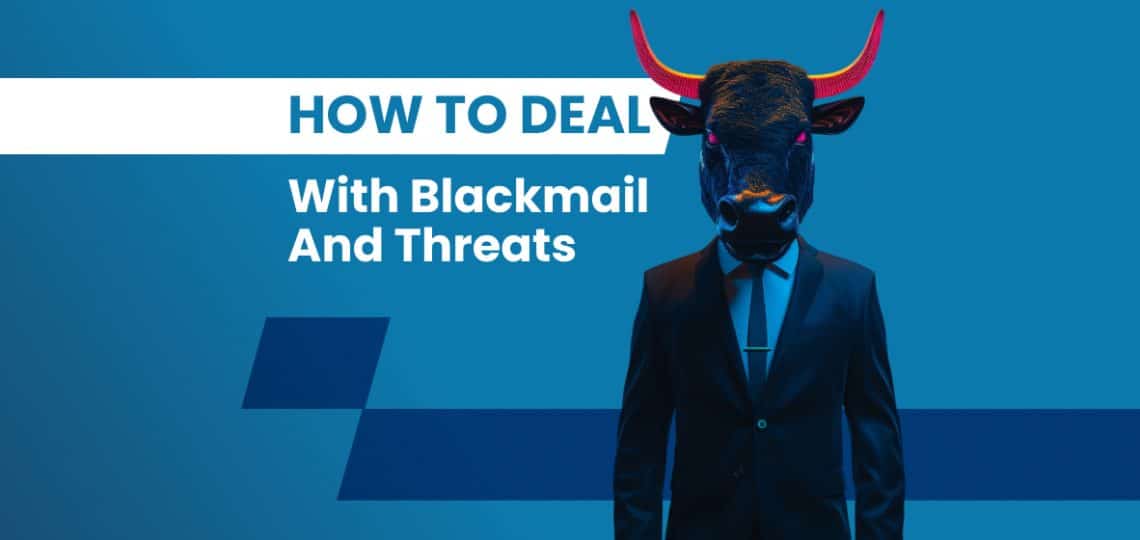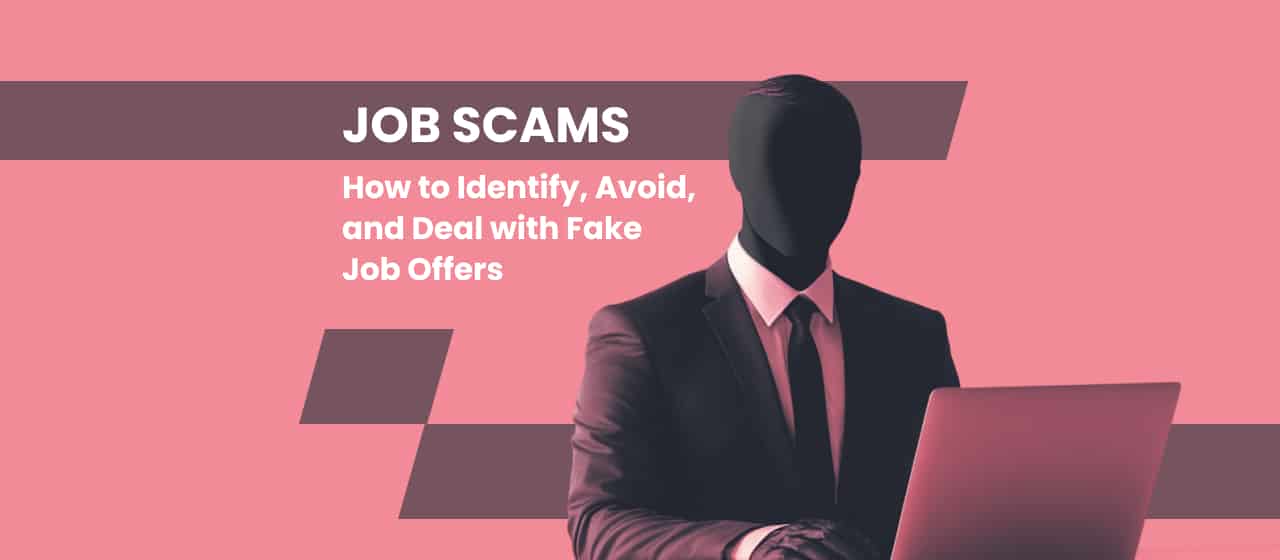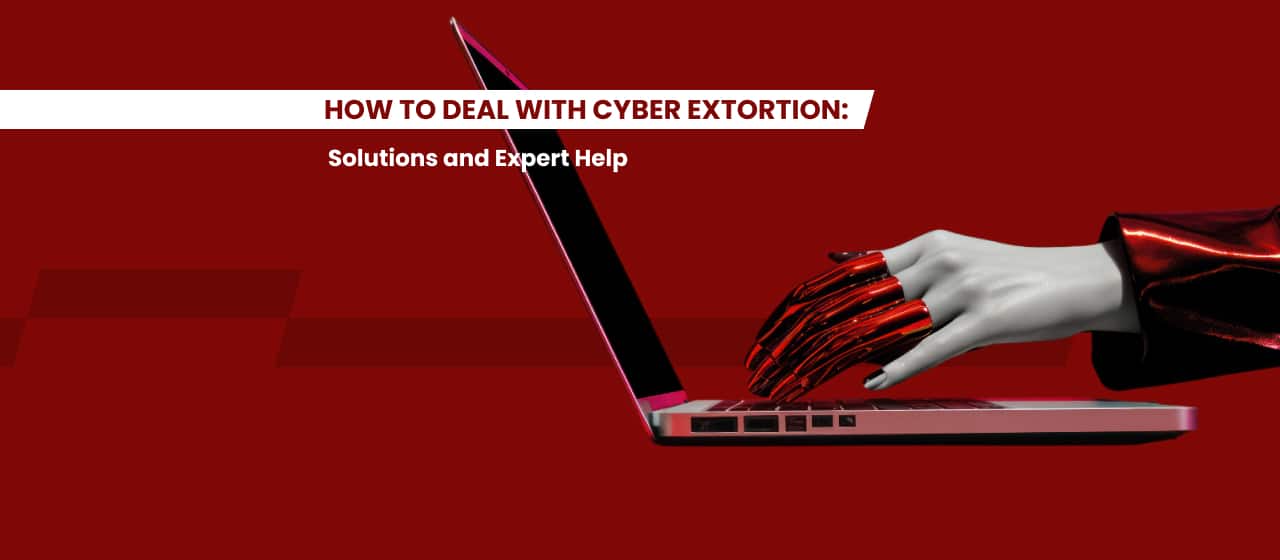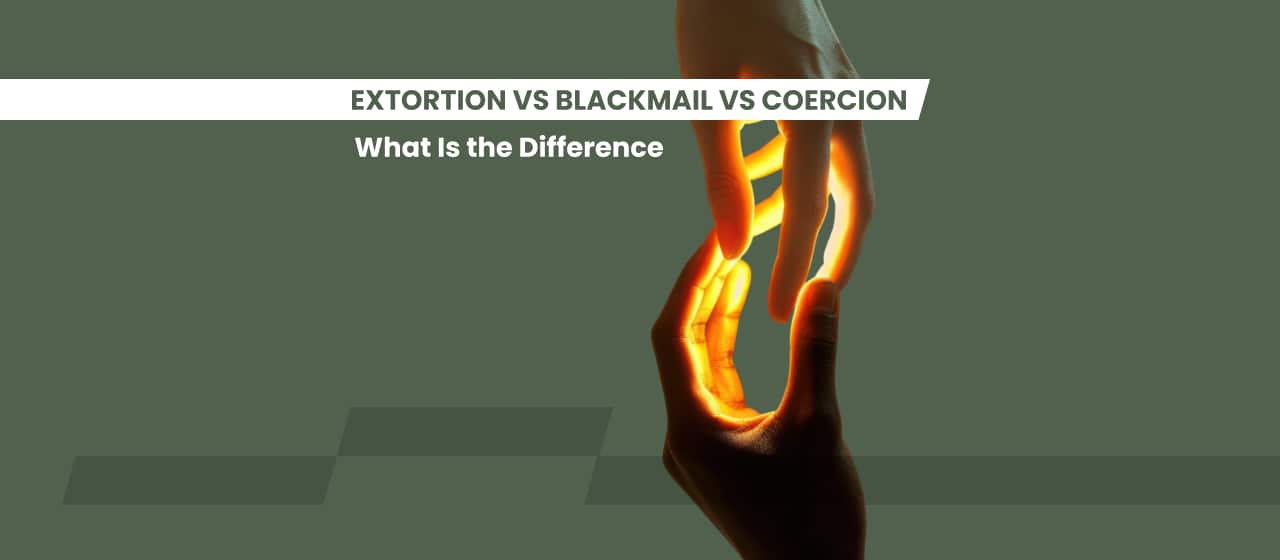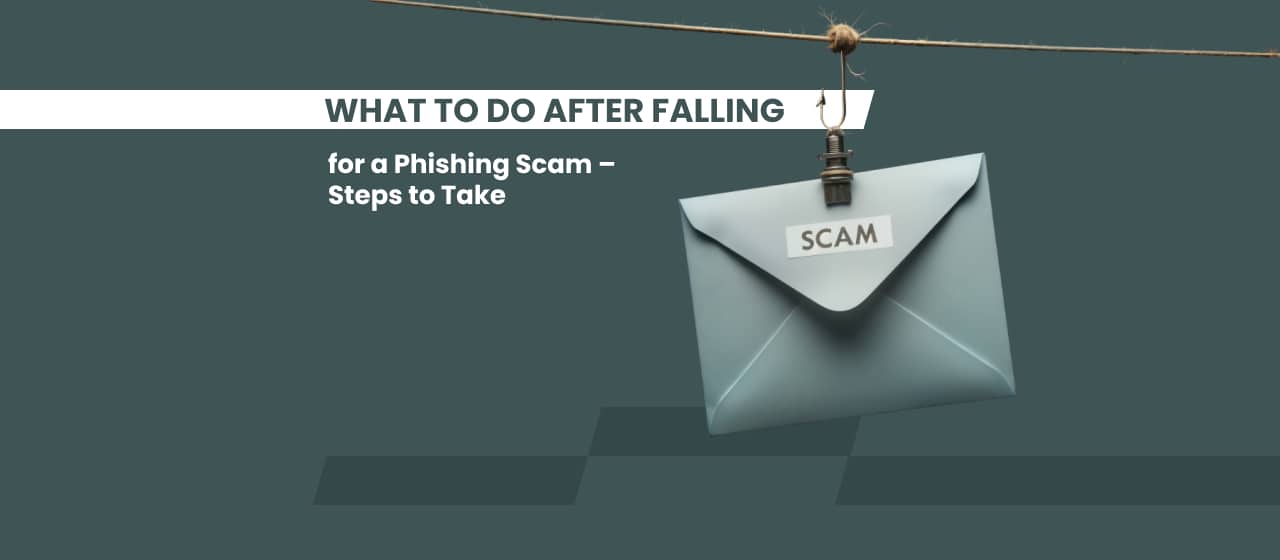Everyone has the right to their privacy. It allows us to have autonomy over our lives, relationships, and reputations in different circles. Blackmailers are particularly dangerous because they look to violate and weaponize that privacy for personal gain. Not only can the threat of blackmail cause severe emotional distress, but it can also disrupt one’s quality of life. Protecting yourself from online blackmail starts with understanding how these scams work. Continue reading to learn what to do if you are blackmailed and how to protect yourself from being targeted.
In-Person vs Online Blackmail
Blackmail is a crime in which someone threatens to publicly expose information to coerce victims into complying with their demands. There are two main categories of blackmail: in-person and online.
In-person blackmail typically involves physical leverage and face-to-face interactions. Items such as photographs, letters, and bank statements may be used to blackmail people for money. In-person blackmailers are typically unable to mask their identity. The perpetrator is usually someone who knows the victim or previously had a relationship with them.
On the other hand, online blackmailers are often anonymous. They use digital means to gain access to private data and threaten to publicly release it online if their demands aren’t met. Things like social media accounts, explicit messages, and hacked devices are commonly used for online blackmail.
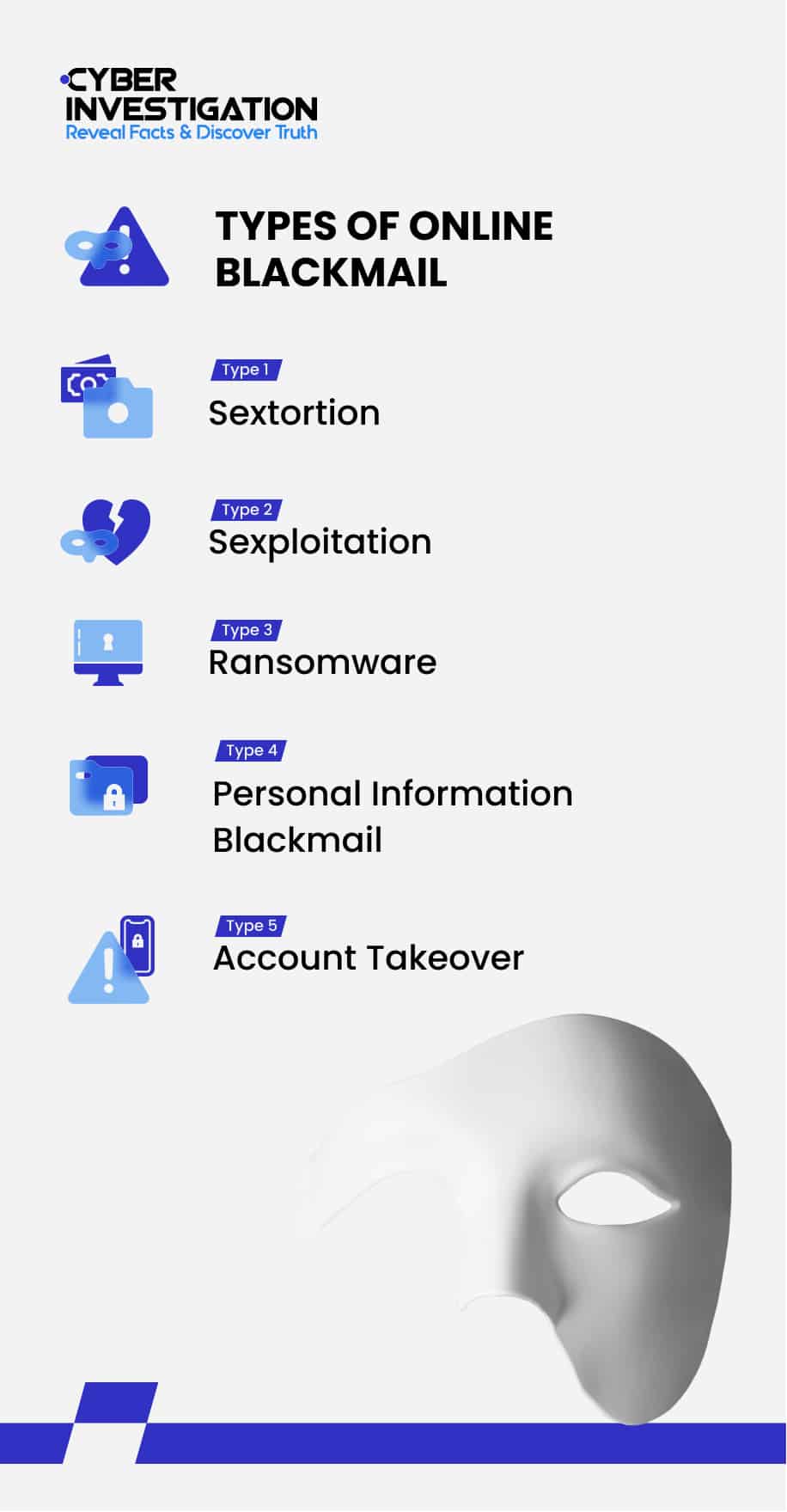
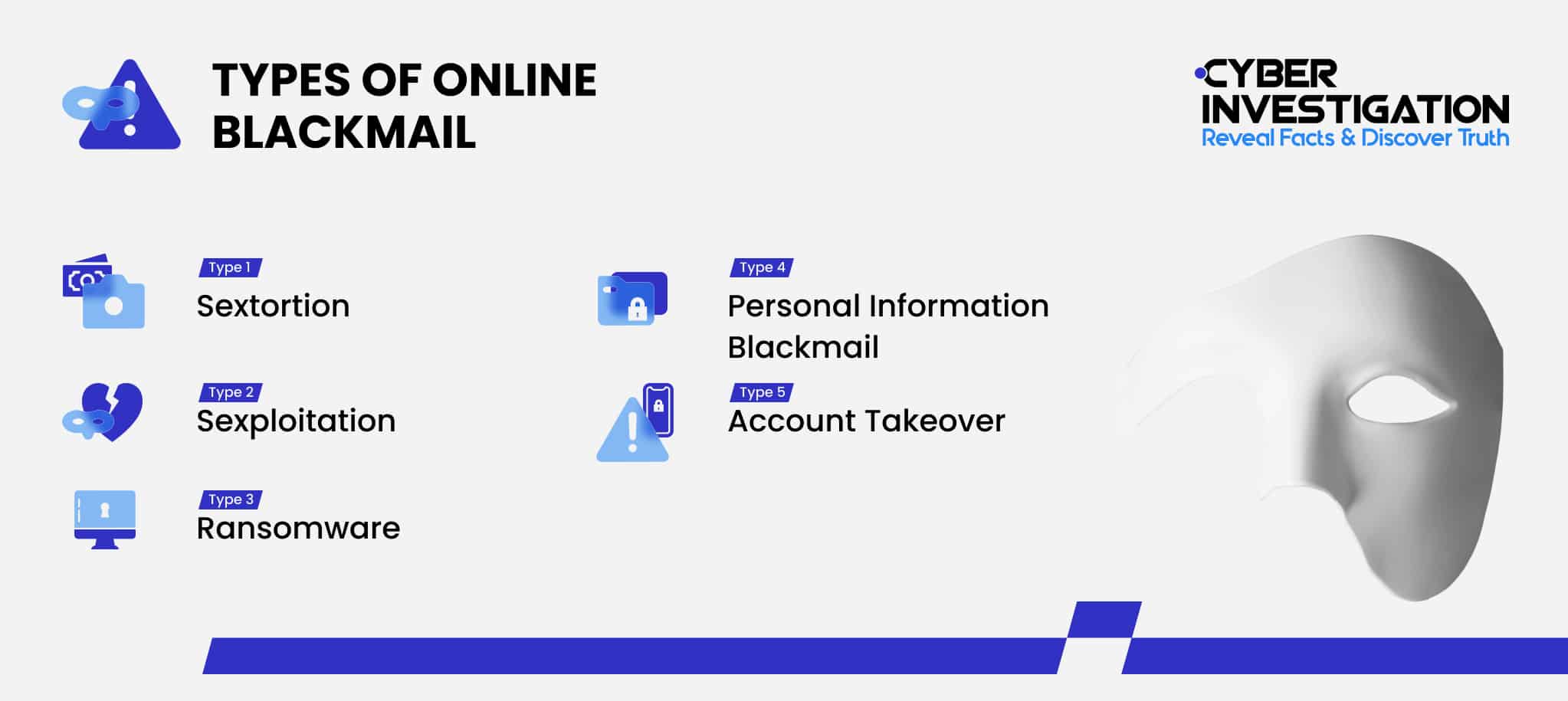
Different Types of Online Blackmail
There are various types of online blackmail, and the number of forms continues to grow as technology advances. Different forms of blackmail are typically defined by the type of demands or leverage used against the victim. Take note of the following five main types of online blackmail that you need to be aware of.
- Sextortion. Many people are looking for resources on how to deal with blackmail because of sextortion. It’s a form of blackmail in which someone threatens to expose the victim’s explicit content unless their demands are met. The most common demand is for money, often requested through cryptocurrency or gift cards.
- Sexploitation. Similarly, sexploitation is when someone threatens to release a victim’s explicit content unless their demands are met. However, the demands are specifically for more explicit content or sexual favors.
- Ransomware. This is malicious software that blocks access to systems, files, or data until a ransom is paid. If the demands are met, the perpetrator will send the victim a decryption tool to regain access to their assets. Ransomware is commonly used against organizations, but it can also be weaponized against individuals.
- Personal Information Blackmail. Certain cybercriminals will use any sensitive information they gain access to for blackmail. Login credentials, Social Security numbers, and credit card accounts are all examples of leverage in blackmail schemes. Hackers often utilize phishing tactics to gain access to this sensitive data.
- Account Takeover. With so much of our lives existing online, hackers now target online accounts for blackmail. Social media, email, and online banking accounts are commonly used as leverage against victims. Similar to personal information blackmail, hackers use phishing tactics to gain access to accounts.
Common Threats Made in Online Blackmail
In the digital era, cybercriminals can commit blackmail with greater efficiency and scale. Blackmailers target dozens — if not hundreds — of people at a time. They rely on victims being unaware of their manipulative and coercive tactics. To help you better understand, we’ve compiled a list of threats you may encounter when someone is blackmailing you online.
- Exposing intimate images or videos. Criminals will threaten to expose private explicit content publicly — either to close contacts, professional colleagues, or the entire internet.
- Exposing personal information. The blackmailer may threaten to release your Social Security number, financial data, or other identifiable information on the dark web, online forums, or data breach dumps.
- Deepfake content. Generative AI and deepfake technology can now alter innocuous images or videos to manufacture illicit or embarrassing content. They may superimpose a victim’s face onto a compromising video.
- Law enforcement impersonation. In certain sextortion schemes, the perpetrator alleges that they are actually a minor and will get the “police” involved. Then, posing as an officer, the perpetrator will contact the victim again to scare them into paying.
- Account lockout and deletion. Once a hacker takes over an online account, they may only offer to return access after you’ve paid a ransom. They will threaten to lock you out of your account permanently or even delete your account if necessary.
What to Do When Someone is Blackmailing You: Step by Step Guide
Blackmailers thrive on their victim’s emotional responses. They hope to frighten you into making a hasty decision. Many times, criminals will rely on the threat of exposure and have no real intentions of doing so. They scare their victims just enough to give in to their demands without going through their threats.
Consider the specifics of the threat. Does it make sense? Is it realistic? Do they have the information they’re claiming to have? Is their message vague, as if it could be sent to anyone? Take your time to process the situation, and don’t rush to any decisions. Consider copying a section of the message and searching to see if others have received similar threats.
If you determine the threat is legitimate, it’s important to understand how to deal with blackmail — and how not to. Every step you take in response is an essential factor in how the scam will end. Follow these steps if you are wondering how to deal with blackmail.
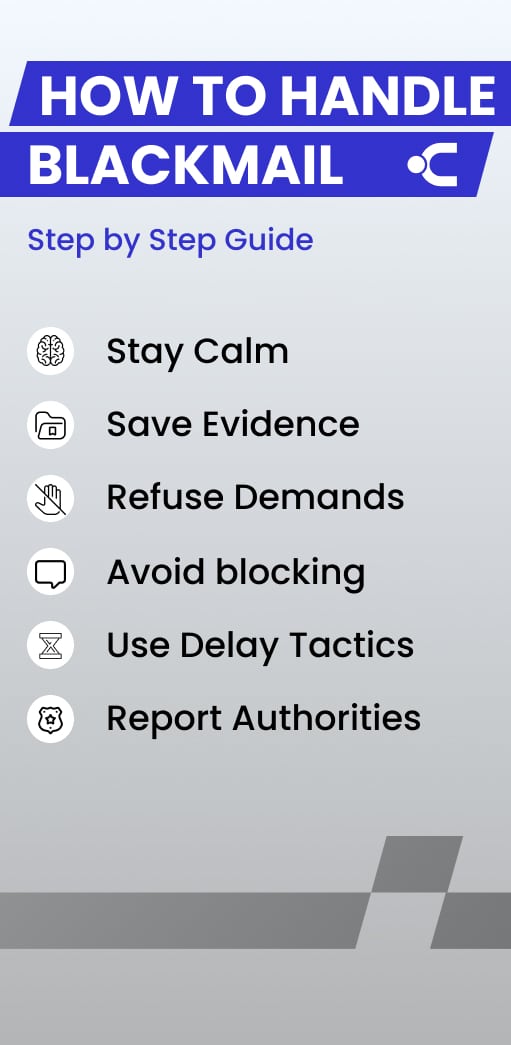
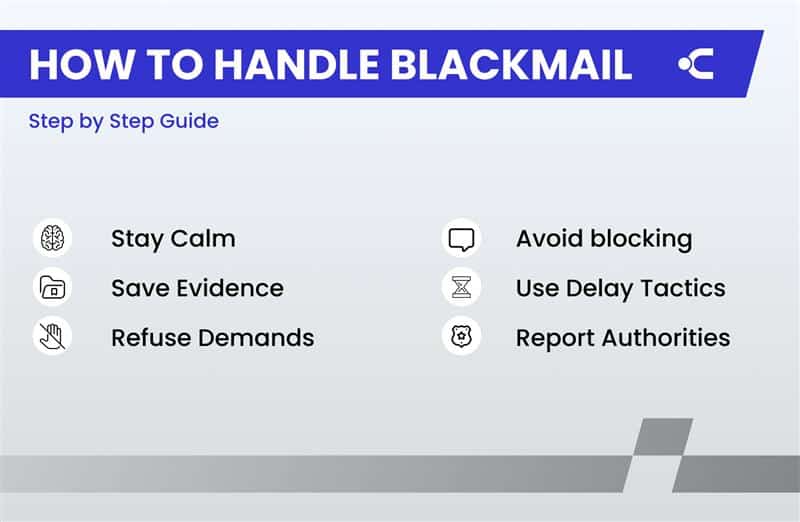
- Keep a cool head. It’s natural to panic when facing blackmail. However, this is what blackmailers are counting on to force you into a rash decision-making process. Instead, stay calm and turn to the advice experts give on how to deal with blackmail.
- Save the evidence immediately. You need evidence of blackmail for experts to be able to perform their investigations. Make sure to immediately preserve the evidence and store it in a secure location. You can take screenshots of messages, ransom notes, emails, or even save infected files on an isolated device.
- Never give in to the demands. You should never comply with a perpetrator’s demands. It is ineffective in putting an end to the blackmail and only encourages the criminal to continue making demands.
- Avoid blocking the perpetrator. Blocking the blackmailer is a common approach. However, it can have devastating repercussions. Cutting off communications often pushes the perpetrator to make good on their threat in retaliation. You also won’t be able to monitor their actions or any threats they continue to make.
- Use delay tactics. While you shouldn’t block the perpetrator, you should keep the line of communication open. If blackmailers use short deadlines to apply pressure on you, use delay tactics to buy time. Delay tactics give you a chance to turn to law enforcement or cybersecurity experts for help. Use excuses such as “I need to wait until my next payday” or “I have to pull the money together.”
- Report to the authorities. Law enforcement officers are well-versed in how to stop blackmail. That’s why victims should always turn to law enforcement for assistance. They can help you file a report, officially documenting the crime. Certain agencies also have cybercrime units that can investigate your blackmailer. However, law enforcement agencies manage high caseloads, which can lead to delays when looking for help.
Emotional and Legal Support for Those Being Blackmailed
Being blackmailed online can trigger intense emotions like anxiety, stress, and even PTSD. It’s important to seek out emotional support as a victim to help you through this experience. Fortunately, there are resources that can help victims of blackmail deal with the emotional toll of the experience. The following are organizations to take note of:
- Cyber Civil Rights Initiative. The CCRI offers support for victims of image-based sexual abuse. They have a 24/7 helpline for emotional support, legal resources, and educational resources.
- National Center for Missing and Exploited Children. This non-profit supports exploited children in many ways. Their CybertTipline is in place for people to report particular forms of blackmail and any NCII abuse against minors. The NCMEC also has a call center available 24/7.
- Trusted friends, family members, or counselors. Talking with someone you trust about what you are going through can help alleviate the stress of the situation. Having a trusted confidant can make the process of dealing with online blackmail more manageable.
Furthermore, many countries have developed laws and regulations to prevent such activities online. For instance, the United Kingdom’s Computer Misuse Act 1990 outlines cybercrime offenses, including hacking, unauthorized access, and harassment. Similarly, the U.S. holds perpetrators of online blackmail accountable under the Computer Fraud and Abuse Act 1986. Being informed about your legal protection is a critical step in recovery.
How to Deal with Blackmail: Real-World Case Studies
One Phishing Attack Leads to Blackmail for a Score of Snapchatters
Bryan Wilson hacked into the Snapchat accounts of over 20 women. He posed as Snapchat security and messaged his targets to respond with their login credentials to save their accounts. Wilson then used the credentials to gain unauthorized access to saved explicit content, which he used as blackmail leverage.
One of his victims responded to the threat of blackmail and exposure with delay tactics. She stalled by telling Wilson that one of her loved ones died. This extra time allowed the victim to build rapport with Wilson and go to her local police. In coordination with law enforcement, the victim was able to get Wilson to send selfies and even got an invite to his lake house. However, this was the information the authorities needed to identify Wilson as a Louisville police officer.
Bryan Wilson was sentenced to two and a half years for cyberstalking and a separate conviction over civil rights violations. This case demonstrates how stalling can be effective, giving victims time to consider how to get rid of blackmail.
The Ransomware Attack on Garmin
In 2020, a hacking group used ransomware named “WastedLocker” to attack the Garmin company. The malicious program encrypts any files it can access and aggressively searches for data backups to erase. Garmin’s main website, its “Garmin Connect” service, and its call centers all went offline from the attack.
The hacking group demanded $10 million to regain access to the encrypted files. Garmin paid the ransom to retrieve the data and resume operations quickly. When deciding how to stop blackmail, it’s common for companies to pay the ransom. Companies comply with blackmail demands in hopes of regaining control over their systems before too much time has passed. This tactic, however, is not recommended by experts.
How to Deal with Blackmail Using Expert Support from Private Firms
When it comes to how to handle blackmail, private cybersecurity firms can offer immediate assistance to blackmail victims. These firms employ experts who can trace the online footprint of your blackmailer, revealing their geolocation and identity. They can also monitor the internet to take down any non-consensual posting of your private data.
If you need help from a cybersecurity firm to understand how to deal with blackmail, contact Cyber Investigation Inc. We have dedicated cybercrime specialists on standby 24/7 to help victims. Reach out to our Blackmail Helpline today to speak to one of our specialists
